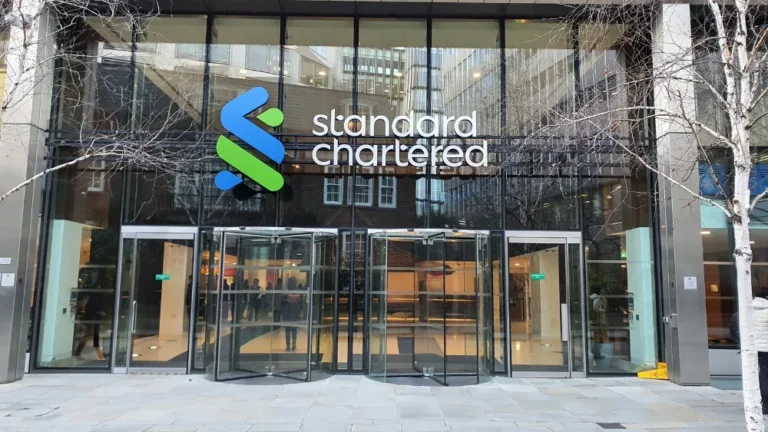Unlock your investment potential with Standard Chartered Trading. Explore innovative tools, expert insights, and strategies to enhance your trading success
Table of Contents
Introduction
Are you looking to elevate your trading experience and maximize your investment potential? Standard Chartered Trading Services offers a comprehensive platform designed for both novice and experienced traders. With advanced tools, real-time market insights, and a user-friendly interface, you can navigate the complexities of the financial markets with confidence. Whether you’re interested in stocks, bonds, or foreign exchange, Standard Chartered provides the resources you need to make informed decisions and achieve your financial goals. In this guide, we’ll explore the features and benefits of their trading services, helping you unlock new opportunities for growth and success.
What is Standard Chartered Trading?
Standard Chartered Trading refers to the brokerage and trading services offered by Standard Chartered Bank, a leading international bank with a strong presence in Asia, Africa, and the Middle East. These services cater to individual and institutional investors looking to trade a variety of financial instruments in global markets.
Key Features of Standard Chartered Trading
Diverse Asset Classes
Standard Chartered Trading allows clients to invest in a wide range of asset classes, including equities, fixed income, foreign exchange, and commodities. This diversity enables investors to build a balanced portfolio tailored to their financial goals.
User-Friendly Trading Platform
The bank provides an advanced trading platform that is accessible via desktop and mobile devices. The platform is designed to be intuitive, allowing users to execute trades quickly and efficiently while accessing real-time market data.
Research and Insights
Standard Chartered offers in-depth research and market insights to help traders make informed decisions. This includes access to expert analysis, economic reports, and market forecasts.
Risk Management Tools
To help clients manage their investments effectively, Standard Chartered Trading includes various risk management tools, such as stop-loss orders and alerts. These features allow traders to set parameters to protect their investments.
Education and Support
The bank provides educational resources, webinars, and tutorials to enhance the trading knowledge of its clients. Additionally, customer support is readily available to assist with any queries or issues.
Global Market Access
Clients can trade in multiple global markets, providing opportunities to capitalize on diverse investment trends and economic conditions. This access is crucial for traders looking to diversify their portfolios.
Regulatory Compliance
Standard Chartered operates in accordance with local regulations and international standards, ensuring a secure trading environment for clients.



How to Start Trading with Standard Chartered
Getting started with Standard Chartered Trading is straightforward. Follow these steps to begin your trading journey:
Open a Trading Account
Visit the Standard Chartered Bank website or a local branch to open a trading account. Complete the application form, providing necessary personal and financial details. Submit required documents, such as identification, proof of address, and income verification.
Choose the Right Account Type
Standard Chartered offers various account types, including individual and joint accounts. Choose the one that best suits your investment needs. Consider whether you want a regular trading account or a more specialized account, such as a margin trading account.
Complete KYC Verification
Undergo Know Your Customer (KYC) verification as part of the account opening process. This may include providing additional documents or attending an interview.
Fund Your Account
Once your account is approved, you’ll need to fund it. You can transfer money from your bank account to your trading account via electronic transfer or other available methods.
Access the Trading Platform
Log in to the Standard Chartered Trading platform using your credentials. You can access it via desktop or mobile. Familiarize yourself with the platform’s interface, tools, and features.
Research and Analyze Markets
Utilize the research and insights provided by Standard Chartered to understand market trends. Explore various financial instruments, such as stocks, bonds, or commodities, to identify investment opportunities.
Place Trades
Once you’ve conducted your analysis, you can start placing trades. Select the asset you want to trade, specify the quantity, and choose your order type (e.g., market order, limit order). Review your order before confirming to ensure accuracy.
Monitor Your Investments
Keep track of your portfolio’s performance through the trading platform. Use alerts and notifications to stay informed about market movements and news that may affect your investments.
Utilize Risk Management Tools
Take advantage of risk management features like stop-loss orders to protect your investments. Regularly assess your risk tolerance and adjust your trading strategy accordingly.
Continue Learning
Engage with educational resources, webinars, and tutorials provided by Standard Chartered to enhance your trading skills. Stay updated on market trends and economic developments that could impact your trading decisions.
Understanding Risk in Trading
In the context of trading, risk refers to the potential for loss or the variability of returns associated with an investment. It is an inherent part of trading and investing, as there is no guarantee that an asset will perform as expected. Understanding different types of risks can help traders make informed decisions and manage their portfolios more effectively.
Types of Risk
Market Risk
This is the risk of losses due to changes in market prices. It encompasses various factors, including economic conditions, political events, and market sentiment. Market risk can affect entire sectors or the overall market.
Credit Risk
Credit risk arises when a counterparty fails to fulfill their financial obligations. In trading, this can occur if a borrower defaults on a loan or if a company goes bankrupt, affecting its stock price.
Liquidity Risk
Liquidity risk is the risk that an asset cannot be quickly sold or converted into cash without a significant loss in value. In less liquid markets, traders may struggle to exit positions, especially during market downturns.
Operational Risk
This risk involves losses resulting from inadequate or failed internal processes, systems, or external events. This can include technical failures, fraud, or other operational issues that can disrupt trading activities.
Interest Rate Risk
Interest rate risk refers to the potential impact on the value of investments due to changes in interest rates. Rising rates can negatively affect bond prices and certain equity sectors, while falling rates may have the opposite effect.
Currency Risk
For traders involved in foreign exchange or international investments, currency risk arises from fluctuations in currency exchange rates. Changes in currency values can affect the profitability of overseas investments.
Regulatory Risk
Regulatory risk stems from changes in laws or regulations that can impact the trading environment. New regulations can impose restrictions on trading practices or affect the valuation of certain assets.
Managing Risk
Effective risk management is crucial for successful trading. Here are some strategies traders can use:
Diversification
Spread investments across various asset classes to reduce exposure to any single investment.
Setting Stop-Loss Orders
Use stop-loss orders to limit potential losses by automatically selling an asset when it reaches a specified price.
Position Sizing
Determine the appropriate amount to invest in each trade based on your overall portfolio and risk tolerance.
Regular Monitoring
Continuously monitor your investments and market conditions to make informed decisions.
Educating Yourself
Stay informed about market trends, economic indicators, and other factors that can impact your investments.
Price of Standard Chartered Trading
| Stock Name | Present Price (as of Today) | Price 1 Year Ago | Price Change |
|---|---|---|---|
| Example Corp (EXM) | ₹1,200 | ₹950 | +₹250 (+26.3%) |
| Sample Inc (SMP) | ₹800 | ₹1,000 | -₹200 (-20%) |
| Demo Ltd (DML) | ₹1,500 | ₹1,200 | +₹300 (+25%) |
| Test Co (TST) | ₹600 | ₹700 | -₹100 (-14.3%) |
| Placeholder AG (PLA) | ₹1,000 | ₹900 | +₹100 (+11.1%) |
Conclusion
Understanding and managing risk is crucial for anyone involved in trading. By recognizing the different types of risks—such as market, credit, liquidity, operational, interest rate, currency, and regulatory risks—traders can make informed decisions and protect their investments. Implementing effective risk management strategies, such as diversification, stop-loss orders, and ongoing education, can significantly enhance your trading success.
Ultimately, while risk is an inherent part of trading, equipping yourself with knowledge and tools to mitigate it can lead to more confident decision-making and better financial outcomes. As you navigate the complexities of the financial markets, remember that informed and proactive risk management is key to achieving your investment goals and sustaining long-term success.
By paisainvests
FAQs About Standard Chartered Trading
How can I stay updated on my trading portfolio?
Clients can monitor their trading portfolios through the Standard Chartered Trading platform, which provides real-time updates on asset performance, market conditions, and account balances.
Can I trade internationally with Standard Chartered?
Yes, Standard Chartered provides access to international markets, allowing clients to trade a variety of global financial instruments and currencies.
Is customer support available for traders?
Yes, Standard Chartered offers customer support for trading inquiries. Clients can reach out via phone, email, or through the bank’s online banking portal for assistance with their trading accounts.
How can I manage my risk while trading?
Effective risk management strategies include diversifying your portfolio, setting stop-loss orders, monitoring market conditions, and staying informed about economic factors that may impact your investments.
What research and insights are available to traders?
Standard Chartered provides clients with in-depth market research, economic reports, and expert analyses to help inform trading decisions. These resources are accessible through the trading platform.
Are there any fees associated with trading?
Yes, there may be various fees, including brokerage fees, transaction fees, and annual maintenance fees. It’s advisable to review the fee structure specific to your trading account.
How does the trading platform work?
The Standard Chartered Trading platform is user-friendly and accessible via desktop and mobile devices. It provides real-time market data, research tools, and features for executing trades.
What financial instruments can I trade through Standard Chartered?
Clients can trade a wide range of financial instruments, including stocks, bonds, mutual funds, ETFs, commodities, and currencies, depending on the market and account type.
Is there a minimum deposit required to start trading?
Yes, the minimum deposit varies depending on the account type and trading preferences. It’s best to check with Standard Chartered for specific requirements related to the account you wish to open.
What types of accounts does Standard Chartered offer for trading?
Standard Chartered offers various account types, including individual accounts, joint accounts, and specialized accounts for margin trading, catering to different investment needs.
How do I open a trading account with Standard Chartered?
To open a trading account, visit the Standard Chartered Bank website or a local branch. You’ll need to complete an application form, provide necessary documents (like ID and proof of address), and undergo KYC verification.
What is Standard Chartered Trading?
Standard Chartered Trading refers to the brokerage services offered by Standard Chartered Bank, allowing clients to trade a variety of financial instruments, including equities, bonds, commodities, and foreign exchange.



